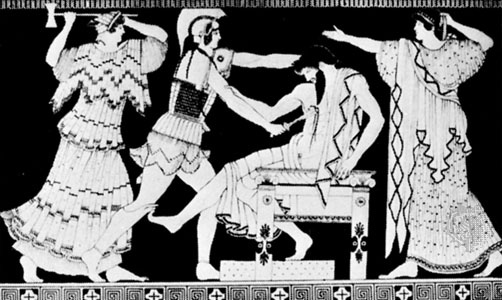Orestes
Greek mythology
 in Greek mythology, son of Agamemnon, king of Mycenae (or Argos), and his wife, Clytemnestra. According to Homer, Orestes was away when his father returned from Troy to meet his death at the hands of Aegisthus, his wife's lover. On reaching manhood, Orestes avenged his father by killing Aegisthus and Clytemnestra.
in Greek mythology, son of Agamemnon, king of Mycenae (or Argos), and his wife, Clytemnestra. According to Homer, Orestes was away when his father returned from Troy to meet his death at the hands of Aegisthus, his wife's lover. On reaching manhood, Orestes avenged his father by killing Aegisthus and Clytemnestra.According to the poet Stesichorus, Orestes was a small child at the time of Agamemnon's murder and was smuggled to safety by his nurse. Clytemnestra was warned of impending retribution by a dream, and Orestes, for the crime of matricide, was haunted by the Furies (Erinyes) after her death. In Aeschylus' dramatic trilogy the Oresteia, Orestes acted in accordance with Apollo's commands; he posed as a stranger with tidings of his own death, and, after killing his mother, he sought refuge from the Furies at Delphi. Prompted again by Apollo, he went to Athens and pleaded his case before the Areopagus. The jury divided equally, Athena gave her deciding vote for acquittal, and the Furies were placated by being given a cult in which they were called Eumenides (Kindly Ones).
 In Euripides' play Iphigenia in Tauris some of the Furies remained unappeased, and Orestes was ordered by Apollo to go to Tauris and bring the statue of Artemis back to Athens. Accompanied by his friend Pylades, he reached his goal, but they were arrested because it was the local custom to sacrifice all strangers to the goddess. The priestess in charge of the sacrifice was Orestes' sister Iphigeneia, who instead of being sacrificed had been spirited away by Artemis; the siblings recognized each other, and they and their friend escaped together, taking the statue with them. Orestes inherited his father's kingdom, adding to it Argos and Lacedaemon. He married Hermione, daughter of Helen and Menelaus, and eventually died of snakebite.
In Euripides' play Iphigenia in Tauris some of the Furies remained unappeased, and Orestes was ordered by Apollo to go to Tauris and bring the statue of Artemis back to Athens. Accompanied by his friend Pylades, he reached his goal, but they were arrested because it was the local custom to sacrifice all strangers to the goddess. The priestess in charge of the sacrifice was Orestes' sister Iphigeneia, who instead of being sacrificed had been spirited away by Artemis; the siblings recognized each other, and they and their friend escaped together, taking the statue with them. Orestes inherited his father's kingdom, adding to it Argos and Lacedaemon. He married Hermione, daughter of Helen and Menelaus, and eventually died of snakebite.The story of Orestes was a favourite in ancient art and literature. Aeschylus' Oresteia showed its dramatic potentialities, and these were further exploited by Sophocles and Euripides. Aspects of the story were also featured in the work of many later Western dramatists and composers.
- Milwaukee Chicago, St. Paul and Pacific Railroad Company
- Milwaukee County Zoo
- Milwaukee Depth
- Milwaukee Journal, The
- Milwaukee, St. Paul and Pacific Railroad Company Chicago
- Mily Balakirev
- Milyukov, Pavel Nikolayevich
- Milyutin, Dmitry Alekseyevich, Count
- Milyutin, Nikolay Alekseyevich
- Milán, Luis
- Milíč, John
- Mimamsa
- Mimas
- Mimbres
- mime and pantomime
- mimeograph
- mimesis
- mimetite
- mimicry
- Mimidae
- Mimi Fariña
- Mimir
- Mimnermus
- mimosa
- Min